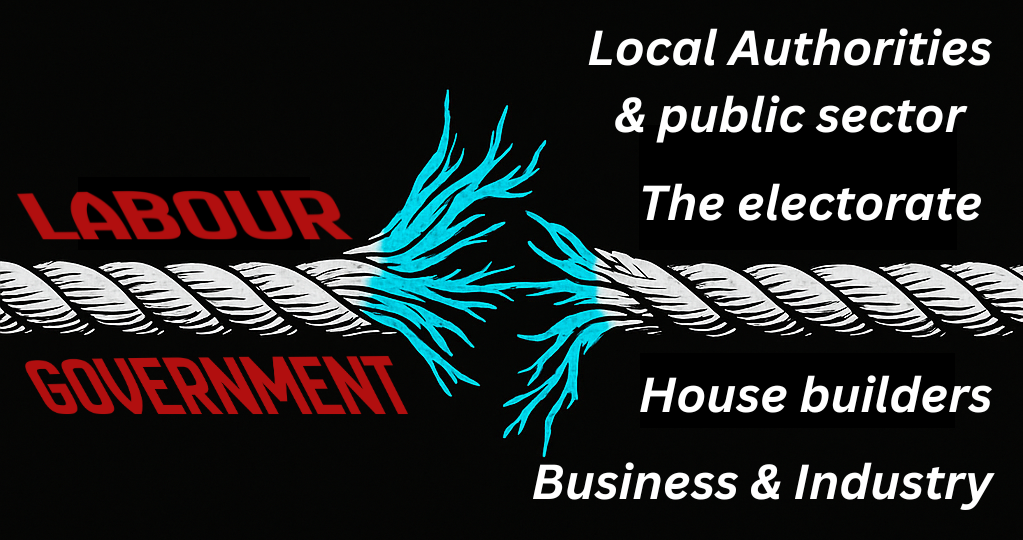Labour’s first year in office have been marked less by bold reform than by distraction, drift and a struggle for momentum. A government that promised to reset Britain now faces questions over whether it has the political capital to deliver.
Some flagship policies already look vulnerable to delay or dilution. Landfill tax reform, the devolution programme, and the extension of the Emissions Trading Scheme (ETS) to energy from waste are all now exposed to delay and dilution. Beyond these, the pattern is becoming clear: every reform creates short-term pain for someone, and Labour seems short on appetite to spend political capital. The danger is obvious. Labour may govern, but does it really change?
Landfill tax changes: hostage to housebuilders?
Expect landfill tax reform to be buried in the November Budget, a footnote in the Red Book rather than a headline in the House of Commons. The issue is not whether it appears, but whether it survives intact.
The construction industry – particularly housebuilders – has the government in a bind. Remove the lower rate, and the threat is implicit: “We won’t lift a finger to help you hit your housebuilding targets.”
It is pure laziness from the construction sector. This reform would incentivise innovation in reuse and recycling. Instead, housebuilders are tempted to use the government’s flagship housing policy as a bargaining chip. Why change business practice when you can simply hold a minister’s agenda hostage?
Devolution: an ideological dead end?
The Devolution Priority Programme was billed as a way to “ignite growth in every region”. But will Labour really push ahead with district- and county-level devolution knowing that local elections in 2026 could hand those powers straight to Reform UK – whom Keir Starmer himself recently branded “an enemy”?
There is also a deeper flaw. The programme has always rested on ideology rather than efficiency. Central government asked councils – the same councils that failed to drive savings during the austerity years – to design the future of local government. Why would Labour now impose upheaval, bringing years of disruption for residents, no obvious savings for the Treasury, and the risk of simply gifting new powers to political opponents?
The suspicion must be that this flagship will be quietly ‘delayed’ into irrelevance.
ETS for energy from waste: the costly certainty
The extension of the Emissions Trading Scheme to energy-from-waste plants looks more secure. Alignment with EU rules makes it harder to row back, and there is precedent from other power generators.
But security is not the same as popularity. ETS will mean another huge bill for local authorities and the wider public sector. And it comes at a time when the UK is already being branded as having the most expensive electricity in the world. Adding another cost to energy bills is not an easy political sell.
Could the government waver? Perhaps not on if it happens, but certainly on when.
What else could slip?
Beyond these three examples, other major commitments look exposed.
- Net Zero and the green transition – big ticket projects like grid upgrades, home insulation and green steel require billions upfront. In a fiscally tight environment, these could be quietly slowed.
- Planning reform – central to unlocking housing and infrastructure, but politically fraught if housebuilders are already playing hardball elsewhere.
- Procurement Act implementation – designed to give SMEs a fairer shot, but easily delayed under pressure from large corporates.
- Public service reform – the NHS workforce plan, education reform, transport upgrades. All carry short-term costs for long-term gain – exactly the kind of investment a government on the back foot avoids.
A slow-motion retreat?
The pattern is striking. Each reform Labour has promised carries upfront pain for someone, whether that’s industry, local government, or the public purse. Yet the long-term benefits only emerge later, by which point today’s ministers may be long gone.
This is the paradox of government. You win power by promising change. But once in office, the temptation is to govern without changing, to manage rather than to reform.
The question for Labour is simple. Does it want to take the political risks of transformation – or is it content to be the government that governs, but does not change?



